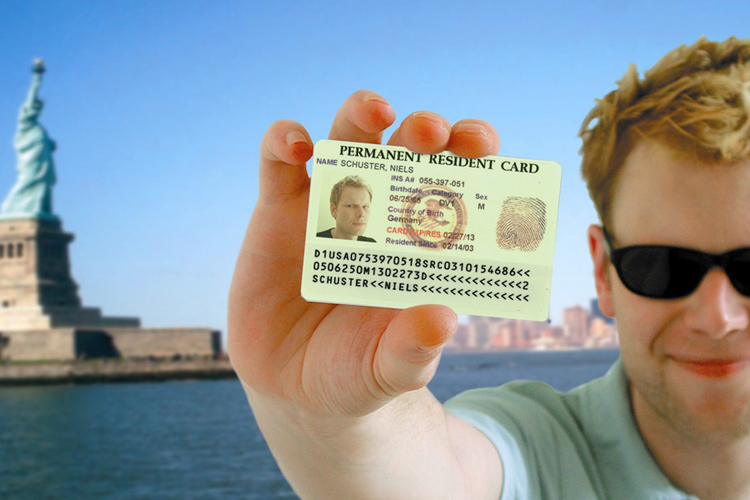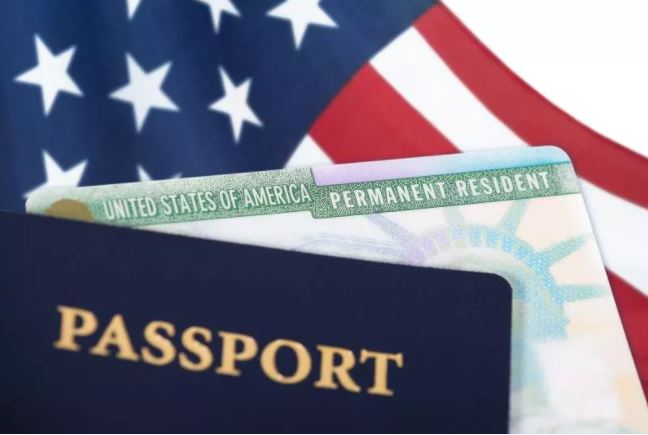Are there ever Disadvantages Of US Green Card?. Here’s a list of 20 things that a Green Card holder in the United States can not do.
A U.S. green card also called a permanent resident card allows a person to live and work in the United States and start the process to become a naturalized U.S. citizen. You’re allowed to change jobs as often as you’d like (or not have a job at all), and you can move from state to state without restriction. This card makes the holder a permanent resident of the United States, entitled to many of the same benefits as a citizen, but not all.
Every year, the U.S. government issues more than one million green cards. In 2019, an estimated 13.9 million green card holders lived in the United States with lawful permanent resident status, of which 9.1 million were eligible to become citizens. Permanent resident status is usually given to three categories: those people who already have a green card and are issued a new one, relatives of U.S. citizens or permanent residents, and workers in the U.S. on employment visas.
With the laws around immigration constantly being updated and reviewed, staying up to date with any changes – and proposed changes – to requirements and legislation is vital. US immigration services will apply any policy changes at a national level almost immediately when they are introduced. This is why it is so important for immigrants to keep up with all the latest changes and information.
This is particularly important for Green Card holders in the United States – those granted permanent legal resident status. It’s also important for them to know about the renewal process for their green card, to avoid potential pitfalls later on.
Obtaining a green card, which signifies your lawful permanent residence in the United States, comes with a number of benefits as well as disadvantages making it not the right choice for everyone, though.
A green card is also the last step on the path to U.S. citizenship. The green card in the United States is a simple process and can be obtained within six months of entering US territory. However, there are disadvantages of US Green Card that may come in the form of tax, compliance to the residency requirements, and further eligibility.
This guide looks at both the disadvantages of getting a green card, as well as a few things to consider.
In this guide, you will learn about:
- What are the disadvanatges of US Green Card?
- The benedits of a Green Card
- Responsibilities of Having a Green Card
- Green Card Eligibility Requirements
- Conclusion on the Cons of US Green Card
With all the talk of green cards going on, it’s all too easy to lose track of its disadvantages imposed on holders since many are only concerned about why it’s so important to have one. With that said, what can green card holders not do in the United States?
List of the Disadvantages of a Green Card
2. You must comply with the residency requirement.
3. Green card holders have tax responsibilities to consider.
4. Immigrants must comply with a medical exam requirement.
5. No Federal Benefits.
6. You must carry the green card with you at all times.
7. Application and Renewal process takes lots of time.
8. You must carry the green card with you at all times.
9. You don’t need to be convicted of a crime to lose your green card.
10. If someone commits a felony, then it can revoke their status.
11. Any drug-related crime can result in a potential loss of permanent residency.
12. Green cardholders may not run for political office.
13. Green cardholders do not have the right to vote.
14. Green cardholders are not issued a U.S. passport.
15. Green cards must be renewed every 10 years.

Below is the full list of the 20 disadvantages and consequences of green cards or permanent resident cardholders in the United States:
1. A US green card does not make you an American citizen
The term “green card” is often used to identify a US-issued residence permit that allows a person to live and work in the United States indefinitely. It does not, however, make you an American citizen. To become a citizen, you’ll need to apply for citizenship and fulfill several conditions, including waiting at least five years after being granted the green card.
2. You must comply with the residency requirement
When someone receives a green card in the United States, then they must spend enough time in the country to demonstrate permanent ties to it. If you don’t intend to make the U.S. a permanent residence, then this option may not be the correct choice. If you are found in non-compliance with this stipulation, then your status can get changed to “abandonment.”
If you take a trip of more than 180 days or travel internationally frequently, then those actions could be enough to take a green card away. You can apply for a permit for extended travel, but it is also a best practice to consult with an experienced immigration attorney if you have concerns about the logistics of your living arrangements.
3. Immigrants must comply with a medical exam requirement
If you are applying for a green card, you must complete a required medical exam as a mandatory part. This process may include vaccinations for every possible medical condition. In addition, you must be medically fit to be eligible to apply for permanent residency. The prior vaccinations are often considered against moral or religious ethics. The good part is, the US recognizes only a few circumstances that justify a waiver of this requirement to deter the entire process.
If you aren’t healthy enough to pass the exam, then the application status could be in jeopardy until you can reach a stage where you are.
4. Green card holders have tax responsibilities to consider
Green card holders have to file taxes, just like other permanent US citizens. Among other things, they are required to pay taxes on wages and interest income.
Several reasons that involve taxation could deter someone from applying for a green card. This status requires someone to declare permanent residency when filing a return. If someone files as a non-resident, then it can immediately impact their status – and even their ability to apply for citizenship one day. Many green card holders find themselves required to pay more in taxes than those with a non-immigrant visa.
Some countries require green cardholders to pay taxes in an immigrant’s home country. The U.S. also requires taxes to get paid. If you’re a green card holder and haven’t filed your return previously, consult with a tax professional immediately. Your taxes may be owed, but more importantly, failure to file taxes could result in serious non-compliance issues with your immigration status.
5. No Federal Benefits
There are further disadvantages of the US Green Card to consider. For example, you may not have access to federal benefits available only to Americans, such as social security and tax credits for education. In addition, if you ever want to pursue citizenship, you will need to prove that you have lived in the US continuously for at least five years with no absences of more than 180 days.
6. It may cause an immigrant to forfeit their home country benefits
Citizens of certain countries can lose specific benefits when they become green cardholders in the United States. Some immigrants can experience this issue even if they don’t receive the document, but they are choosing to live in the U.S. for an extended period. Australians can lose their right to vote in local elections after not returning for six years.
Every nation has its own laws regarding the status of citizens that live in a different country. Each immigrant must research their local regulations to determine if there are benefits that they want to keep before applying for a green card.
7. You must carry the green card with you at all times
Section 264 of the Immigration and Nationality Act states that anyone who fails to comply with the provisions and regulations of their green card status is guilty of a misdemeanor. That means you must apply for a certificate of registration and receive a card that clearly states your status. If you are over the age of 18, then it must be carried with you at all times and in your personal possession.
8. Receiving a green card can cause a loss of support staff
If a foreign nation is the primary visa holder with a support team attached to the document, obtaining a green card can invalidate the status of everyone else. That’s why someone who has had the same people with them for several years may decide to maintain their current status. A director with O-1 status would lose everyone associated with them with this disadvantage.
When you are in the U.S. on a work visa, then you’ll want to speak with an immigration attorney about your status to see if there are options available to keep your support staff.
9. Application and Renewal process takes lots of Time
In order to go through the process of acquiring a green card, one will need to be legally present in the US for at least five years. This means that people who do not have an employer-sponsored visa and are awaiting their approval for permanent residency status will need to make sure that they meet this requirement.
The USCIS recommends that anyone with a green card submit their renewal application within six months of the expiration date to ensure their status doesn’t get interrupted. Depending on the field office or service center that you must use, the estimated range could be over a year. The time range that the USCIS offers is based on the date the documentation gets received. The initial issuance of a green card can be between 8-13 months at any office.
If an immigrant delays their application process, the expiration date on their green card isn’t going to change. Their legal status could change because of this disadvantage.
10. You might be given a conditional green card
The standard green card gives the recipient ten years of eligibility as a permanent resident in the United States. Some people might receive a conditional green card instead. If an immigrant receives this document, then it is one that is ineligible for renewal. That person must file a petition to remove the conditions attached to their status 90 days before the expiration date. If someone fails to act on this issue, then that person will lose their permanent resident status.
Family-based conditional permanent residents must file Form I-751 to try to eliminate this disadvantage of the immigration process. Investors and entrepreneurs must file Form I-829.
11. Immigrants cannot appeal a denial of their green card status
If the United States denies a green card application, then the government will send that person a letter explaining the decision. There is no way to appeal a denial. The only option available is to submit a motion to reopen or reconsider at the same office that made the unfavorable decision. That gives the individual more time to reconsider their action, but the documentation must state new facts and include appropriate evidence for the motion to receive consideration.
A motion to reconsider must show an incorrect application of immigration law or policy. Some decisions may be incorrect based on evidence that’s in the file already.
12. If someone commits a felony, then it can revoke their status
If someone is a lawful resident of the United States, then their criminal activity will become part of the discovery process during a renewal. Any felony conviction, even for a minor offense, can be enough to justify deportation. The green card expires every ten years, so you must go for the documentation even with a criminal record. The Immigration and Nationality Act contains a long list of crimes that qualify for deportation, and some of them may even be misdemeanors.
13. You don’t need to be convicted of a crime to lose your green card
From a general standpoint, the definition of a conviction under the immigration laws in the United States is broader than what it is when dealing with criminal law. Any outcome where an individual gets found guilty by a court or admits guilt through a plea bargain can result in a problem with the individual’s immigration status. This disadvantage occurs even if someone gets told that there won’t be a criminal conviction on their record.
If an immigrant were to be arrested on a drug charge, the court might allow that person to participate in a drug treatment program as part of a diversion effort. You wouldn’t have a criminal record in the state where the incident happened, but the USCIS would still consider the incident as a conviction on your record that may qualify for deportation.
14. Any drug-related crime can result in a potential loss of permanent residency
Any drug-related criminal conviction can make someone ineligible to receive a green card. This disadvantage applies even if the conviction was for possession intended for personal use. The Immigration and Nationality Act only provides one exception to this issue. If you were found to have 30g or less of marijuana for personal use, then you can apply for a waiver when dealing with your green card status. Anything else will make someone become ineligible for a green card unless extraordinary circumstances apply.
Waivers are strictly impossible for anyone convicted of torture or murder offenses.
15. Green cardholders do not have the right to vote.
16. Green card holders do not have as high a priority in sponsoring other family members for green cards as U.S. citizens.
Green cards themselves are non-transferable and are not automatically extended to children born outside the United States.
17. Green cardholders may not run for political office.
18. Green cardholders are not issued a U.S. passport.
19. Green cards must be renewed every 10 years.
20. Full protection from deportation is not guaranteed to green cardholders
But as a reminder, green card holders are protected from deportation should U.S. immigration law change.

The Benefits Of A Green Card
Green card holders, also known as lawful permanent residents, enjoy benefits that visa holders do not receive, including the following.
- If you have a green card, you can apply for U.S. citizenship after five years (three years if you’re married to a U.S. citizen).
- With a green card of your own, you may sponsor certain relatives for visas or green cards.
- A green card enables you to travel in and out of the U.S. more easily.
- You’ll be eligible for local tuition, which means you’ll spend less money on college, university, or vocational school tuition.
- You can simply renew a green card every 10 years.
- A green card makes you eligible to make financial contributions to U.S. elections, which means you can support candidates that have policies that will make your life easier or that you otherwise agree with.
Responsibilities of having a Green Card
Once you are a green card holder, you hold certain responsibilities as a legal permanent resident of the United States.
- Green card holders, like U.S. citizens, must file income tax returns and report income to the Internal Revenue Service (IRS) as well as state tax authorities.
- Green card holders are obligated to obey the laws of the United States, their state of residence, and their local jurisdictions.
- Male green card holders, between the ages of 18-25, must register for the Selective Service. (Note the United States has not had a draft since 1973).
- Green card holders must carry a valid green card at all times. Not having a green card on you can lead to up to 30 days in jail.
- Green card holders, like U.S. citizens, may not engage in any attempts to change the form of government through illegal means.
Green Card Eligibility Requirements
In order to apply for a green card, you must meet certain eligibility requirements. Typically, most immigrants receive a green card through family or through employment. You can also obtain a green card as the victim of abuse, as a special immigrant, through the registry, or through refugee or asylum status.
The following are the main eligibility requirements to obtain a green card:
- Be the immediate relative of a U.S. citizen, which includes being the spouse of a U.S. citizen, an unmarried child under the age of 21 of a U.S. citizen, or the parent of a U.S. citizen who is at least 21 years old.
- Be another relative of a U.S. citizen or a lawful permanent resident under the family-based preference categories.
- Be the fiance(e) of a U.S. citizen or the fiance(e)’s child.
- Be the widow(er) of a U.S. citizen.
- Be an immigrant worker or investor or have a physician national interest waiver.
To view the full green card eligibility requirements from the United States Citizenship and Immigration Services (USCIS), click here.
Conclusion on Cons of US green Card
A green card is an effective way to begin the process of becoming a citizen of the United States. This documentation allows permanent residency for up to 10 years at a time. Once you receive approval, only your decisions will create opportunities for the government to revoke your status.
There can be situations when a conditional green card might not receive renewal. The regulations involved are strict and unforgiving. If you miss a deadline or allow the documentation to expire, then an unfavorable outcome is likely to happen.
The advantages and disadvantages of a green card are essential to consider before you start applying for the process in your bid to live and work in the United States. The complexity of the rules and regulations that involve the U.S. and an immigrant’s home country often requires the help of an attorney, an accountant, and other professionals to ensure that the process runs as smoothly as possible.







